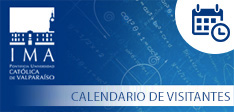International Seminar Diversity and Inclusion in Mathematics Teacher Education

Program
Tuesday, April 11th
Sala Aula
10:00 – 10:30 Welcome to the Seminar
Melissa Andrade-Molina. Pontificia Universidad Católica de Valparaíso, Chile
Luz Valoyes Chavez. Universidad Católica de Temuco, Chile
Paola Valero. Stockholm University, Sweden
10:30 – 12:30 Block 1: Challenging policies of inclusion and diversity
This block has the intention of introducing the seminar by coming close to experiences that led to challenge inclusion and diversity in mathematics teacher education (i.e., cultural diversity and multilingualism). The intention is to build an understanding of how diversity has entered the scene of mathematics teacher education practices and institutions in different settings.
Lecturer’s short presentations will be followed by participants’ reflections on why they are interested in this topic and what is the central concern for them now. With small group discussions, an exercise of mapping central concerns of research will be carried out as a chart for the course discussions to address during the following blocks.
Moderator:
- Paola Valero. Stockholm University, Sweden
Speakers:
- Manuel Goizueta. Pontificia Universidad Católica de Valparaíso, Chile
- Erika García. Universidad Autónoma de Querétaro, Mexico
- Luz Valoyes Chavez. Universidad Católica de Temuco, Chile
12:30 – 14:30 Lunch break
14:30 – 16:30 Block 2: Dealing with teacher education’s paradoxes
This block focuses on unfolding theoretical tools to trouble the current (and historical) state of mathematics teacher education. The toolboxes invite to examine the double gestures that make visible the paradoxes on mathematics teacher education. The intention is to build an understanding of how diversity enters the mathematics teacher education within the image of a desired teacher embedded in policy and practice.
Moderator:
- Luz Valoyes-Chávez. Universidad Católica de Temuco, Chile
Speakers:
- Alex Montecino. Universidad de Tarapacá, Chile
- Vanessa Neto. Universidad Federal de Mato Grosso do Sul, Brazil
- Cristina Esteley. Universidad Nacional de Córdoba, Argentina
Wednesday, April 12th
Sala Aula
10:00 – 12:00 Block 3: Diversity and Otherness in Mathematics Education: Theoretical and Methodological Challenges
This block has the intention of discussing theoretical and methodological challenges in approaching issues of diversity in mathematics education. The main focus will be the use by researchers of theories and methods to study different markers of diversity (gender, racial, ethnic, class, ability) in the field. Lecturers’ short presentations will be followed by participants’ reflections on how these theoretical and methodological approaches have contributed to understanding practices and discourses that contribute to the construction of otherness in the mathematics education system of practices. With small group discussions, an exercise of mapping central concerns of research will be carried out as a chart for the course discussions to address during the following blocks.
Moderator:
- Manuel Goizueta. Pontificia Universidad Católica de Valparaíso, Chile
Speakers:
- Hendrik Van Steenbrugge. Stockholm University. Sweden
- Melissa Andrade-Molina. Pontificia Universidad Católica de Valparaíso, Chile
12:00 – 14:00 Lunch break
Room 2-3
14:00 – 17:00 Block 4: Articulating Notions of Diversity and Otherness in Mathematics Education Research (Ph.D. Block)
This block focuses on the discussion of how theories and notions of diversity and otherness are unfolded in particular research projects and their results, and how they have been articulating both theoretical perspectives and methodological strategies. PhD students’ projects will be presented and discussed. Participating PhD students are asked to bring to the seminar:
- The central notions or conceptions related to diversity and/or otherness used in their projects,
- A graph or image of how the notions or conceptions unfold in results, as compared to their articulation in theory or methodology.
The discussion in groups will lead to a mapping of central notions of research in this area, and their conceptualisation in different contexts. These will be presented in plenary at the end of the day.
Moderator:
- Melissa Andrade-Molina. Pontificia Universidad Católica de Valparaíso, Chile
- Ph.D. Students are the main speakers
Thursday, April 13th
Sala Aula
10:00 – 12:00 Block 5: Experiences of diversity and inclusion in the mathematics classroom
This block focuses on how notions of diversity and inclusion are unfolded in particular research projects and educational settings. We revisit experiences collected in different school contexts and their implications for research.
Moderator:
- Alex Montecino. Universidad de Tarapacá, Chile
Speakers:
- Aldo Parra. Universidad del Cauca. Colombia
- Renato Marcone. Universidad de São Paulo. Brazil
- Adriana Magallanes. Universidad Nacional de Rio Claro. Argentina
12:00 – 14:00 Lunch break
14:00 – 16:00 Block 6: Challenges to and Opportunities in Researching Mathematics (Teacher) Education.
This block focuses on discussing the challenges both for research and for bringing research into teacher education. The intention is to identify key issues for further research, but particularly think of how there could be strategies for feeding teacher education with research results in ways that may qualify student teachers for dealing with a changed student body.
Moderator:
Melissa Andrade-Molina. Pontificia Universidad Católica de Valparaíso, Chile
Speakers:
Veronica Jatko Kraft. Stockholm University, Sweden
Anette de Ron. Stockholm University, Sweden
Paola Valero. Stockholm University, Sweden
Leslie Jiménez. Universidad de Chile, Chile
16:00 – 16:30 Closing
Melissa Andrade-Molina. Pontificia Universidad Católica de Valparaíso, Chile
4 Semestres
Más información
4 Semestres
Más información
4 Semestres
Más información
8 Semestres
Más información
8 Semestres
Más información




